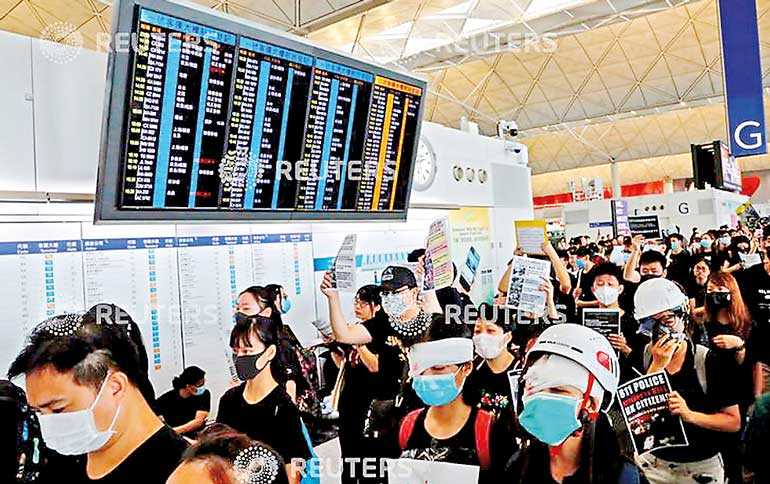Wednesday Feb 25, 2026
Wednesday Feb 25, 2026
Tuesday, 13 August 2019 00:00 - - {{hitsCtrl.values.hits}}

Anti-extradition bill protesters attend a mass demonstration after a woman was shot in the eye during a protest at Hong Kong International Airport, in Hong Kong, China 12 August – Reuters
HONG KONG (Reuters): Hong Kong’s airport cancelled all flights on Monday, with authorities blaming demonstrators for the disruption of one of the world’s busiest terminals, a dramatic escalation of anti-government protests that have roiled the Asian financial hub.
At the same time a Chinese official in Beijing warned signs of “terrorism” were emerging. China’s People’s Armed Police also assembled in the neighbouring city of Shenzhen for exercises, the state-backed Global Times newspaper said.
Both moves lift the stakes sharply after a weekend of skirmishes between police and activists, in which both sides appeared to boost their resolve with new tactics.
Some of the 5,000 activists occupying the airport’s arrivals hall for a fourth day went to the departure area and caused disruptions, Hong Kong police told a news conference, but declined to say if they would move to clear the demonstrators.
Traffic to and from the airport was severely affected.
“Airport operations at Hong Kong International Airport have been seriously disrupted ... all flights have been cancelled,” the city’s airport authority said in a statement.
“All passengers are advised to leave the terminal buildings as soon as possible.”
Roads to the airport were congested and car parks were full, the authority said.
The increasingly violent protests have plunged the Chinese-ruled territory into its most serious crisis in decades, presenting Chinese leader Xi Jinping with one of his biggest popular challenges since he came to power in 2012.
Monday’s cancellation came as China’s Hong Kong and Macau Affairs office said the city had reached a critical juncture and after police had made a show of demonstrating a powerful water cannon.
The protests began in opposition to a bill allowing extradition to the mainland but have widened to highlight other grievances, drawing broad support.
Over the weekend, as demonstrators threw up barricades across the city, police shot volleys of tear gas into crowded underground train stations for the first time, and fired bean-bag rounds at close range.
Scores of protesters were arrested, sometimes after being beaten with batons and bloodied by police. Police have arrested more than 600 people since the unrest began more than two months ago.
Tear gas was fired at the blackshirted crowds in districts on Hong Kong island, Kowloon and the New Territories, with one young female medic hospitalised after being shot in the right eye, triggering a protest by medical workers.
“Hong Kong’s protesters have been frequently using extremely dangerous tools to attack the police in recent days, constituting serious crimes with sprouts of terrorism emerging,” said Hong Kong and Macau Affairs office spokesman Yang Guang.
“Hong Kong has come to a critical juncture. All those who care about Hong Kong’s future, must firmly come out and say no to all violent behaviour, say no to all violent people.”